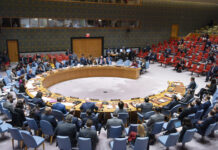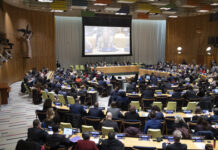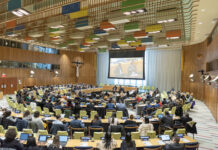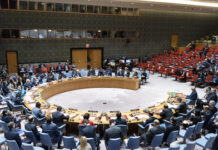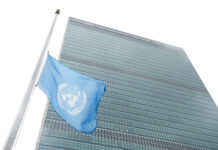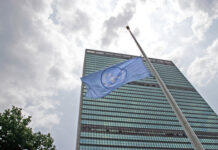This is the News in Brief from the United Nations
Gaza: Top UN aid official calls for end to attacks on sites sheltering civilians
Attacks on buildings in Gaza where terrified civilians are sheltering are “abhorrent and must stop immediately”, a top UN humanitarian official insisted on Thursday, after a direct hit on a United Nations training centre.
The death toll from intensified fighting in the area around the centre in the southern city of Khan Younis, has risen to 13 confirmed fatalities and 56 injured – 21 critically – said Thomas White, Deputy Humanitarian Coordinator for the Occupied Palestinian Territory.
“Persistent attacks on civilian sites in Khan Younis are utterly unacceptable and must stop immediately,” he said, adding that on Wednesday the UN centre “was hit by two shells and caught fire”, before condemning the “consistent failure to uphold the fundamental principles of international humanitarian law” which are distinction, proportionality and precautions in carrying out attacks.
Amid ongoing heavy fighting involving Israeli Defense Forces and Palestinian armed groups around hospitals and shelters in Khan Younis, the UN official warned that staff, patients and displaced people were “trapped inside and lifesaving operations (had been) impeded”.
“A number of missions to assess the situation were denied,” Mr. White maintained, adding that on Wednesday evening “the UN finally managed to reach the affected areas to treat trauma patients, bring medical supplies and evacuate injured patients to Rafah”.
$1.8 billion needed to restore Libyan communities after catastrophic flooding
To Libya, where the repair bill for catastrophic flooding last September that affected some 1.5 million people has been estimated at $1.8 billion, according to the UN team there.
More than 4,300 people died and thousands more were reported missing after Storm Daniel made landfall in Libya, bringing strong winds and sudden heavy rainfall that caused dams to burst, destroying thousands of buildings.
Building more resilient homes and public infrastructure is a critically important part of the post-disaster recovery process, the UN Support Mission in Libya (UNSMIL) insisted, in a joint report with the World Bank and the European Union.
Georgette Gagnon, the top UN official in the country, said that “time is of the essence for affected people” in the east, notably the coastal city of Derna, which satellite imagery showed had been all but washed out to sea by the disaster.
Ms. Gagnon noted that the report offered “a clear path forward” for reconstruction, including the creation of a coordinated national platform.
“Let’s channel our collective resources and expertise towards rebuilding, prioritizing the people – their livelihoods and wellbeing,” she said.
Stigma and shame still surround leprosy victims, warn top rights experts
Although leprosy is age-old and can be cured, the disease is still endemic in more than 120 countries, leaving an estimated one to two million people visibly disfigured by the disease and lacking support to cope with the stigma they face.
That’s the urgent message from top UN-appointed human rights experts on Thursday who said that some 200,000 new cases of leprosy are registered each year, worldwide.
People suffering from leprosy – which is also known as Hansen’s disease – have a right to high-quality support and health care, the rights experts maintained, as they urged governments and international organizations to make sure their policies and procedures reflected this fundamental requirement.
In a statement endorsed by the UN World Health Organization and UN Women, the rights experts noted that leprosy patients and their families continue to be segregated in “ex-colonies”, kept away from public spaces and interaction with other people.
Ahead of World Leprosy Day on 28 January, the rights experts – who are known as Special Rapporteurs – stressed that affected persons had a right to early detection and treatment, as well as rehabilitation and active support.
Children, the elderly and women are particularly affected by leprosy and judgmental attitudes and policies towards the disease, along with minorities and indigenous peoples, the rights experts said.
Daniel Johnson, UN News.
Source of original article: United Nations (news.un.org). Photo credit: UN. The content of this article does not necessarily reflect the views or opinion of Global Diaspora News (www.globaldiasporanews.com).
To submit your press release: (https://www.globaldiasporanews.com/pr).
To advertise on Global Diaspora News: (www.globaldiasporanews.com/ads).
Sign up to Global Diaspora News newsletter (https://www.globaldiasporanews.com/newsletter/) to start receiving updates and opportunities directly in your email inbox for free.




